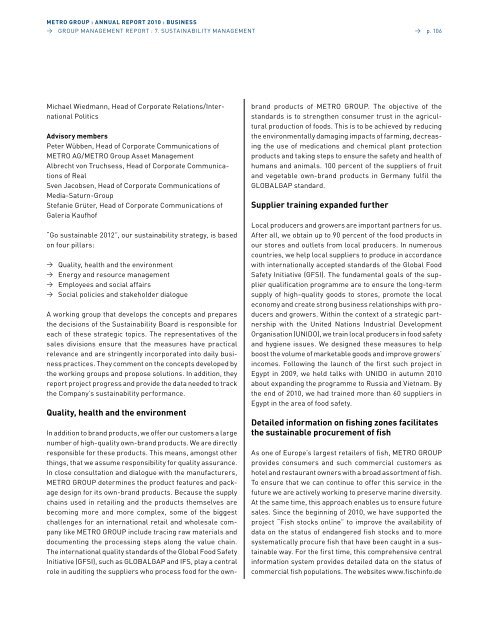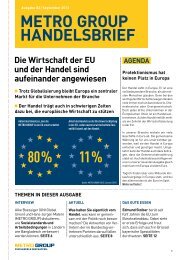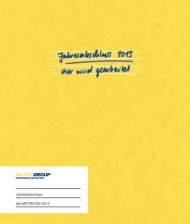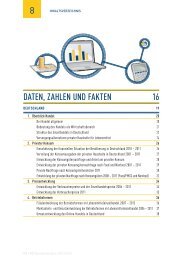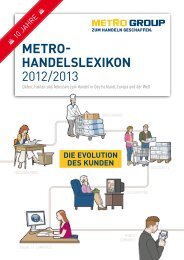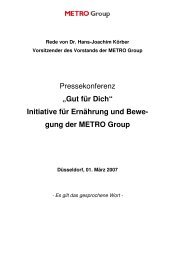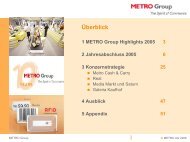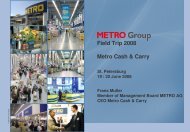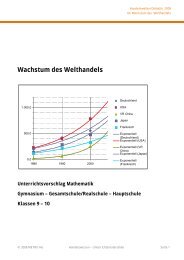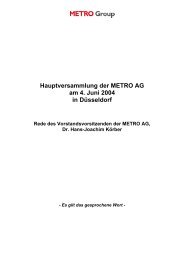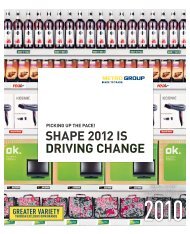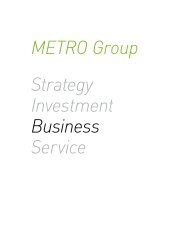pdf (2.5 MB) - METRO Group
pdf (2.5 MB) - METRO Group
pdf (2.5 MB) - METRO Group
You also want an ePaper? Increase the reach of your titles
YUMPU automatically turns print PDFs into web optimized ePapers that Google loves.
<strong>METRO</strong> GROUP : ANNUAL REPORT 2010 : BUSINESS<br />
→ GROUP MANAGEMENT REPORT : 7. SUSTAINABILIT y MANAGEMENT<br />
Michael wiedmann, head of Corporate Relations/International<br />
Politics<br />
Advisory members<br />
Peter wübben, head of Corporate Communications of<br />
<strong>METRO</strong> AG/<strong>METRO</strong> <strong>Group</strong> Asset Management<br />
Albrecht von Truchsess, head of Corporate Communications<br />
of Real<br />
Sven Jacobsen, head of Corporate Communications of<br />
Media-Saturn-<strong>Group</strong><br />
Stefanie Grüter, head of Corporate Communications of<br />
Galeria Kaufhof<br />
“Go sustainable 2012”, our sustainability strategy, is based<br />
on four pillars:<br />
→ Quality, health and the environment<br />
→ Energy and resource management<br />
→ Employees and social affairs<br />
→ Social policies and stakeholder dialogue<br />
A working group that develops the concepts and prepares<br />
the decisions of the Sustainability Board is responsible for<br />
each of these strategic topics. The representatives of the<br />
sales divisions ensure that the measures have practical<br />
relevance and are stringently incorporated into daily business<br />
practices. They comment on the concepts developed by<br />
the working groups and propose solutions. In addition, they<br />
report project progress and provide the data needed to track<br />
the Company’s sustainability performance.<br />
quality, health and the environment<br />
In addition to brand products, we offer our customers a large<br />
number of high-quality own-brand products. we are directly<br />
responsible for these products. This means, amongst other<br />
things, that we assume responsibility for quality assurance.<br />
In close consultation and dialogue with the manufacturers,<br />
<strong>METRO</strong> GROUP determines the product features and package<br />
design for its own-brand products. Because the supply<br />
chains used in retailing and the products themselves are<br />
becoming more and more complex, some of the biggest<br />
challenges for an international retail and wholesale company<br />
like <strong>METRO</strong> GROUP include tracing raw materials and<br />
documenting the processing steps along the value chain.<br />
The international quality standards of the Global Food Safety<br />
Initiative (GFSI), such as GLOBALGAP and IFS, play a central<br />
role in auditing the suppliers who process food for the own-<br />
→ p. 106<br />
brand products of <strong>METRO</strong> GROUP. The objective of the<br />
standards is to strengthen consumer trust in the agricultural<br />
production of foods. This is to be achieved by reducing<br />
the environmentally damaging impacts of farming, decreasing<br />
the use of medications and chemical plant protection<br />
products and taking steps to ensure the safety and health of<br />
humans and animals. 100 percent of the suppliers of fruit<br />
and vegetable own-brand products in Germany fulfil the<br />
GLOBALGAP standard.<br />
Supplier training expanded further<br />
Local producers and growers are important partners for us.<br />
After all, we obtain up to 90 percent of the food products in<br />
our stores and outlets from local producers. In numerous<br />
countries, we help local suppliers to produce in accordance<br />
with internationally accepted standards of the Global Food<br />
Safety Initiative (GFSI). The fundamental goals of the supplier<br />
qualification programme are to ensure the long-term<br />
supply of high-quality goods to stores, promote the local<br />
economy and create strong business relationships with producers<br />
and growers. within the context of a strategic partnership<br />
with the United Nations Industrial development<br />
Organisation (UNIdO), we train local producers in food safety<br />
and hygiene issues. we designed these measures to help<br />
boost the volume of marketable goods and improve growers’<br />
incomes. Following the launch of the first such project in<br />
Egypt in 2009, we held talks with UNIdO in autumn 2010<br />
about expanding the programme to Russia and vietnam. By<br />
the end of 2010, we had trained more than 60 suppliers in<br />
Egypt in the area of food safety.<br />
Detailed information on fishing zones facilitates<br />
the sustainable procurement of fish<br />
As one of Europe’s largest retailers of fish, <strong>METRO</strong> GROUP<br />
provides consumers and such commercial customers as<br />
hotel and restaurant owners with a broad assortment of fish.<br />
To ensure that we can continue to offer this service in the<br />
future we are actively working to preserve marine diversity.<br />
At the same time, this approach enables us to ensure future<br />
sales. Since the beginning of 2010, we have supported the<br />
project “Fish stocks online” to improve the availability of<br />
data on the status of endangered fish stocks and to more<br />
systematically procure fish that have been caught in a sustainable<br />
way. For the first time, this comprehensive central<br />
information system provides detailed data on the status of<br />
commercial fish populations. The websites www.fischinfo.de


